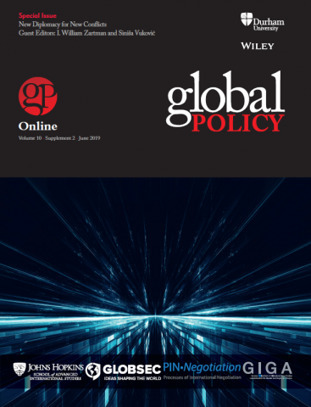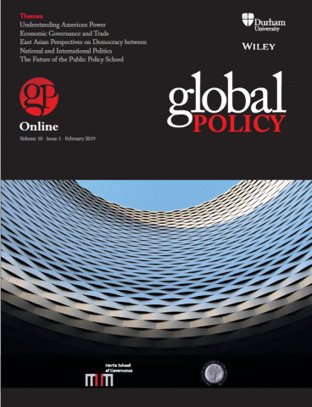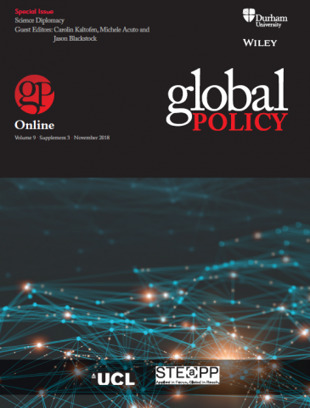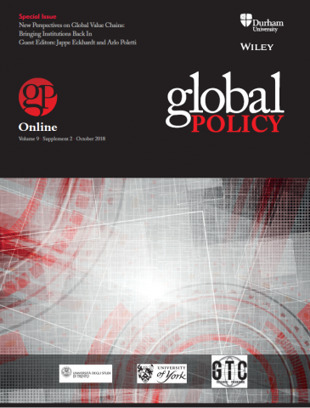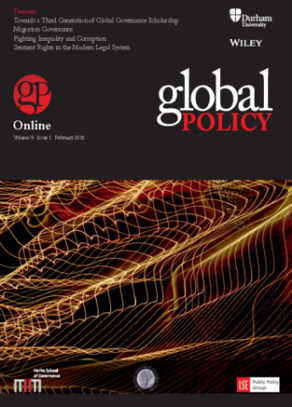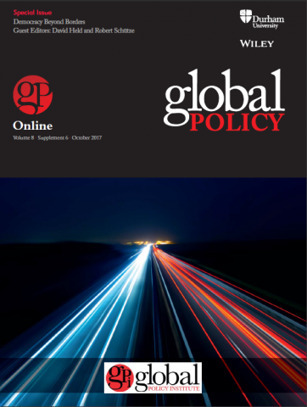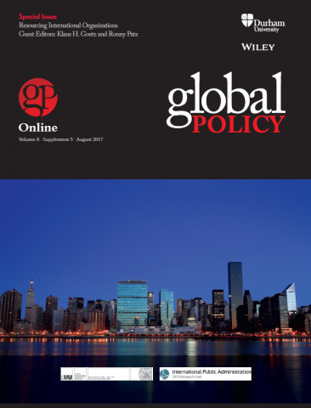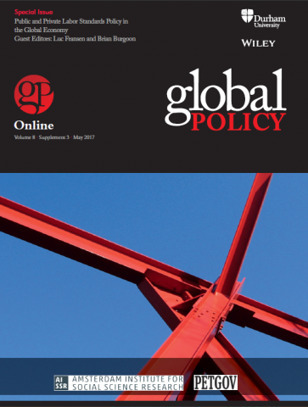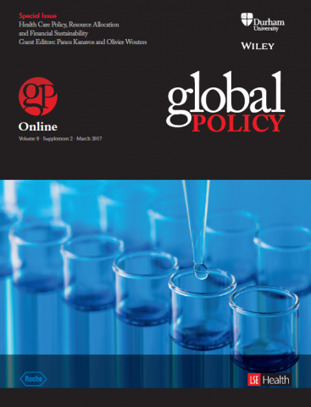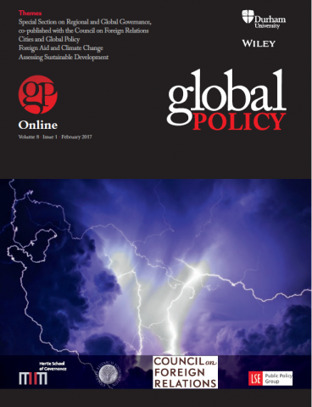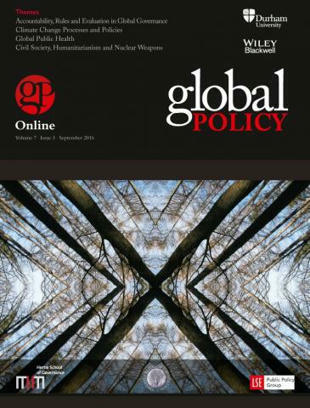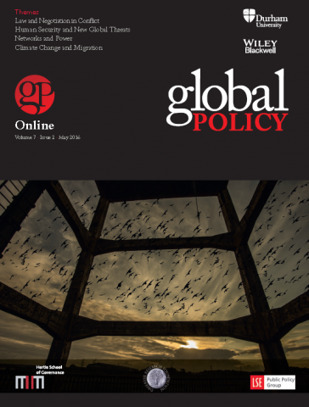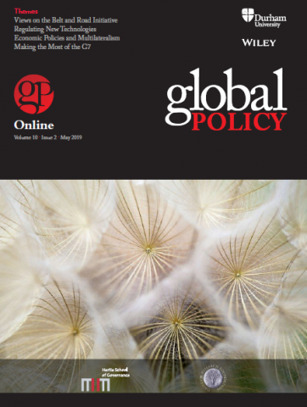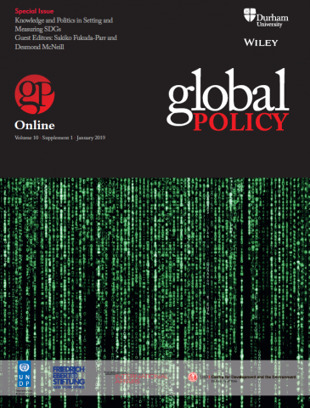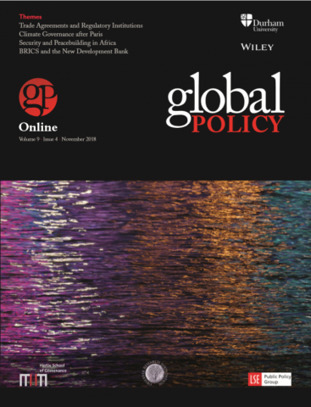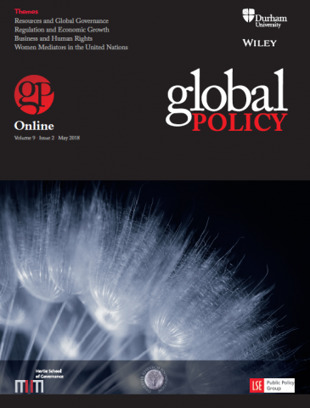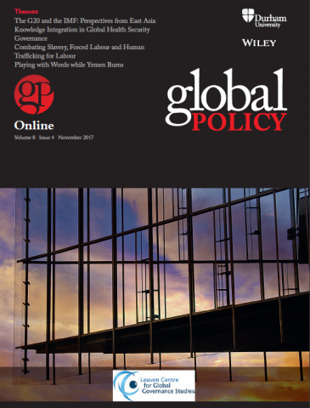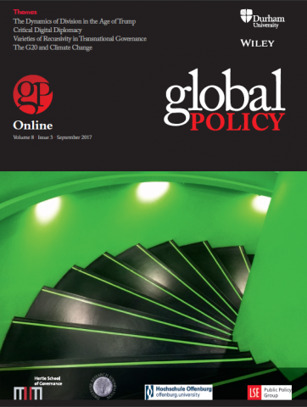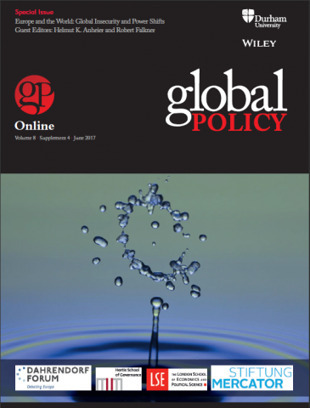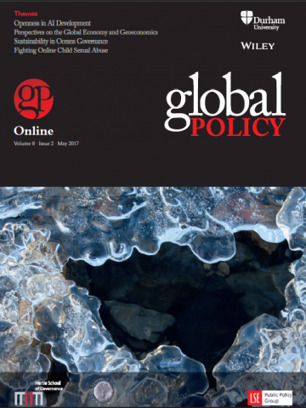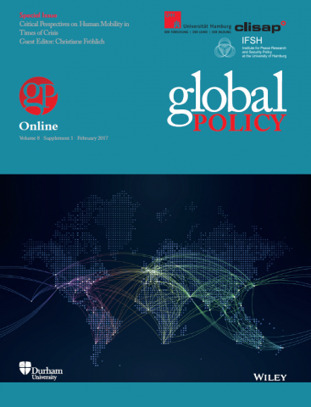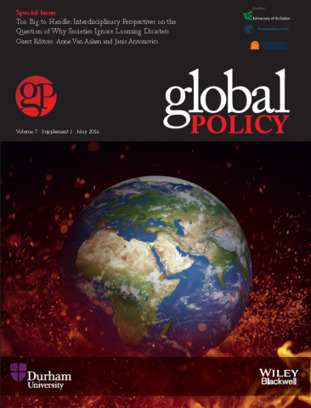 Your new post is loading...
Special Issue - New Diplomacy for New Conflicts Release Date 18 July 2019
Vol 10, Issue 1, February 2019 (Open Access) The February 2019 issue of Global Policy has two special sections: The first contains responses to Helmut K. Anheier’s essay ‘On the Future of the Public Policy School’. The second entitled ‘Theorizing Democracy between National and International Politics: A Snapshot from East Asia' is introduced by Chia‐Ming Chen and Jean‐Marc Coicaud. The issue also includes research articles on American power, CERN, rising powers in global economic governance and terrorism’s influence on voting patterns. There is a policy insight examining sustainable investing and two new response articles. Research Articles Understanding American Power: Conceptual Clarity, Strategic Priorities, and the Decline Debate - Adam Quinn and Nicholas Kitchen Rising Powers in Global Economic Governance: Mapping the Flexibility‐Empowerment Nexus - Eugénia C. Heldt and Laura C. Mahrenbach Development Unchained: Trade and Industrialization in the Era of International Production - Richard Kozul‐Wright and Piergiuseppe Fortunato The CERN Community; A Mechanism for Effective Global Collaboration? - Mark Robinson Poly‐criminal Pirates and Ballooning Effects: Implications for International Counter‐piracy - Katja Lindskov Jacobsen Meet in the Middle: Terrorism and Centrist Party Vote Shares in Legislative Elections - Lance Y. Hunter, Joseph W. Robbins, Martha H. Ginn and Aaron Hutton Special Section I - On the Future of the Public Policy School On the Future of the Public Policy School - Helmut K. Anheier Response Articles The Future of the Public Policy School in a World of Disruptive Innovation - Lisa Anderson On Democratic Reason - Ira Katznelson The Future Development of Schools of Public Policy: Five Major Trends - Jack H. Knott Right On, Helmut!- Mark H. Moore On the Future of Public Policy Schools: What Can Be Done to ‘Take Back Control’? - Claus Offe A Response from Beyond the Public Policy School - Erika J. Techera On the Future of Public Policy Schools, in Developing Countries - Lan Xue Towards the New Laswell School of Public Policy - Helmut K. Anheier Special Section II - Theorising Democracy between National and International Politics: A Snapshot from East Asia Introduction - Chia‐Ming Chen and Jean‐Marc Coicaud The Paradoxical Perception of Contemporary Democracy, and the Question of its Future - Jean‐Marc Coicaud A Confucian Case for Equal Membership for Foreign Domestic Workers - Sungmoon Kim Liberal Democracy, Illiberal Immigrants, and Equality - Yuchun Kuo Instrument contra Human End: Self‐determination as a Right to Protect Power - Chia‐Ming Chen Policy Insights Money, Millennials and Human Rights: Sustaining ‘Sustainable Investing’ - John Gerard Ruggie and Emily K. Middleton Response Articles Assessing Trade–Labor Linkages: A Big Step Forward - Kimberly Ann Elliott Additional Challenges in Democracy Support and the Need for Donors to Confront some Neglected Issues - Kebapetse Lotshwao Release Date 28 February 2019
Special Issue – Science Diplomacy Release Date 29 November 2018
Special Issue - New Perspectives on Global Value Chains: Bringing Institutions Back In Release Date 31 October 2018
Special Issue - Ten Years after the Global Financial Crisis: Lessons Learned, Opportunities Missed Release Date 06 June 2018
Vol 9, Issue 1, February 2018 Release Date 15 February 2018
Special Issue: Democracy Beyond Borders Edited by David Held and Robert Schütze, this special issue of Global Policy brings together a group of scholars from law, political science, philosophy, sociology, and history to discuss and assess the extent to which democracy can crystallise beyond the nation state, and whether such developments are, in principle, desirable. Of course, the debate about democracy beyond borders is not new; there have been extensive philosophical and political reflections stretching back through the ages. The purpose of the special issue is to reconsider these debates particularly in the light of the attempts at supranational institution building that have been made in the 20th century. This reconsideration is prompted by a striking paradox: while the forces of globalisation create an ever-greater demand for global cooperation, the belief in the legitimacy of international institutions is gradually declining. Introduction David Held and Robert Schütze - Democracy Beyond Political Borders: An Introduction to the Special Issue Part I. Democracy – (Supra)national Realities Robert Schütze - Parliamentary Democracy and International Treaties Sergio Fabbrini - Which Democracy for a Union of States? A Comparative Perspective of the European Union Armin von Bogdandy - EU Insights for Political Inclusion in International Institutions Hilary Charlesworth - International Legal Encounters with Democracy Part II. Democracy – (Supra)national Ideas Hauke Brunkhorst - Democracy under Siege of Authoritarian Liberalism: Remarks on the Crisis of National and Transnational Republicanism in Europe David Held and Pietro Maffettone - Moral Cosmopolitanism and Democratic Values Daniele Archibugi and Marco Cellini - The Internal and External Levers to Achieve Global Democracy Charles S. Maier - Democratic Dangers Beyond Borders Release Date 06 October 2017
Special Issue: Resourcing International Organizations Release Date 24 August 2017
Special Issue: Public and Private Labor Standards Policy in the Global Economy
Special Issue: Health Care Policy, Resource Allocation and Financial Sustainability Given the growing complexity of health care, current global demographic and epidemiologic trends, adverse economic conditions in many parts of the world, and limited national budgets, it is increasingly difficult for policymakers and regulators to ensure continued access to affordable and high-quality health care. Decision-makers must implement policies that support efficient, equitable, and sustainable health systems. To that end, this special issue has three aims: (1) to analyse trends in health-care financing in a range of countries with varying degrees of economic development and political organization; (2) to review the viability of different financing models based on international experiences; and (3) to examine how efficiency in health care systems can be achieved without sacrificing quality. The issue consists of three sections and includes contributions from academic experts, health-care practitioners, and members of the broader stakeholder community. Introductory Editorial Panos Kanavos and Olivier J. Wouters - Health Care after the Great Recession: Financing Options for Sustainable and High-quality Health Systems An Appraisal of Financing Health Care Options Aris Angelis, David Tordrup and Panos Kanavos - Is the Funding of Public National Health Systems Sustainable over the Long Term? Evidence from Eight OECD Countries Olivier J. Wouters and Martin McKee - Private Financing of Health Care in Times of Economic Crisis: a Review of the Evidence Walter W. Holland - Health Improvement in a Period of Austerity: a Public Health Perspective Joan Costa-Font, Christophe Courbage and Peter Zweifel - Policy Dilemmas in Financing Long-term Care in Europe Mackenzie Mills, Nicola Boekstein, Maxine Mackintosh and Panos Kanavos - Towards High Quality Health Care and Sustainable Financing – the Role of Health Care Programmes Tools to improve efficiency and measure performance in health care delivery Jonathan Cylus, Irene Papanicolas and Peter C. Smith - Using Data Envelopment Analysis to Address the Challenges of Comparing Health System Efficiency John S. F. Wright, Anthony J. G. Barron, Sara M. B. Shah and Corinna Klingler - Convergence, Divergence and Hybridity: A Regulatory Governance Perspective on Health Technology Assessment in England and Germany Aris Angelis, Panos Kanavos and Gilberto Montibeller - Resource Allocation and Priority Setting in Health Care: A Multi-criteria Decision Analysis Problem of Value? Panos Kanavos, Alessandra Ferrario, Giovanni Tafuri and Paolo Siviero - Managing Risk and Uncertainty in Health Technology Introduction: The Role of Managed Entry Agreements Country Case Studies and Stakeholder Views Gabriel E. Novick - Health Care Organization and Delivery in Argentina: A Case of Fragmentation, Inefficiency and Inequality Hector E. Castro - Advancing HTA in Latin America: The Policy Process of Setting up an HTA Agency in Colombia Jeremy Lim - Sustainable Health Care Financing: The Singapore Experience Wei Yang and Xun Wu - Providing Comprehensive Health Insurance Coverage in Rural China: a Critical Appraisal of the New Cooperative Medical Scheme and Ways Forward Karl T. Muth - The Way Forward: A Look at Liberalization of LDC Health Insurance Markets Anna Zawada, Katarzyna Kolasa, Christian Kronborg, Daniel Rabczenko, Tomasz Rybnik, Jørgen T. Lauridsen, Urszula Ceglowska and Tomasz Hermanowski - A Comparison of the Burden of Out-of-Pocket Health Payments in Denmark, Germany and Poland Fernando Arnaiz - New Funding Models Help Improve Access to Healthcare Jean Mossman, Mary G. Baker and Ingrid Kössler - Patient Power as a Driver for Change: Reality or Rhetoric? Release Date 13 April 2017
Vol 8, Issue 1, February 2017 Global Policy’s February 2017 issue contains, among others, research articles on the emergence of powerful non-political global leaders, the wisdom of addressing climate change through unilateralism, civil society consultations for sustainable development, and collective security between Russia and the West. It has a special section on 'Regional Challenges to Global Governance', co-produced with the CFR and edited by Miles Kahler. It also features a survey article that critically reviews DFID's Needs-Effectiveness Index for aid disbursements. Research Articles
Lena Partzsch - Powerful Individuals in a Globalized World Michele Acuto, Mika Morissette and Agis Tsouros - City Diplomacy: Towards More Strategic Networking? Learning with WHO Healthy Cities Markus Fraundorfer - The Role of Cities in Shaping Transnational Law in Climate Governance Peter Drahos and Christian Downie - Regulatory Unilateralism: Arguments for Going It Alone on Climate Change Michael Hübler - The Future of Foreign Aid in a Globalizing World with Climate Change Erin R. Graham - The Promise and Pitfalls of Assembled Institutions: Lessons from the Global Environment Facility and UNAIDS Carole-Anne Sénit, Frank Biermann and Agni Kalfagianni - The Representativeness of Global Deliberation: A Critical Assessment of Civil Society Consultations for Sustainable Development William R. Moomaw, Rishikesh Ram Bhandary, Laura Kuhl and Patrick Verkooijen - Sustainable Development Diplomacy: Diagnostics for the Negotiation and Implementation of Sustainable Development Tom Sauer - The Origins of the Ukraine Crisis and the Need for Collective Security between Russia and the West Survey Article Michael Tribe - Quantifying Aid Allocation: A Critical Review of the DFID Needs-Effectiveness Index Special Section - Co-published by Global Policy and the Council on Foreign Relations 'Regional Challenges to Global Governance', edited by Miles Kahler Miles Kahler - Regional Challenges to Global Governance C. Randall Henning - Avoiding Fragmentation of Global Financial Governance Chad P. Bown - Mega-Regional Trade Agreements and the Future of the WTO Hongying Wang - New Multilateral Development Banks: Opportunities and Challenges for Global Governance Erik Voeten - Competition and Complementarity between Global and Regional Human Rights Institutions Paul D. Williams - Global and Regional Peacekeepers: Trends, Opportunities, Risks and a Way Ahead Release Date 08 February 2017
Vol 7, Issue 3, September 2016 Global Policy’s September 2016 issue contains, among others, research articles on Accountability in International Governance and the 2030 Development Agenda, Global Extinction in Climate Change Policy, the WTO Rules in a Value-chain World, and Preventive Action in World Politics. It has a special section on ‘Civil Society, Humanitarianism and Nuclear Weapons’, edited by Matthew Bolton. It also features a Practitioner's Special Section on ‘Evaluation, International Organizations, and Global Policy’, and Commentaries the UN Secretary-General in the Climate Change Process, and Negotiating Across Cultures on Peace and Security Issues. Research Articles
José Antonio Ocampo and Natalie Gómez-Arteaga - Accountability in International Governance and the 2030 Development Agenda Yew-Kwang Ng - The Importance of Global Extinction in Climate Change Policy Pauline Eadie - Counter-terrorism, Smart Power and the United States Chris Jenkins, Marta Lomazzi, Heather Yeatman and Bettina Borisch - Global Public Health: A Review and Discussion of the Concepts, Principles and Roles of Global Public Health in Today's Society Markus Fraundorfer - How to Confront the Threat of Ebola? Arguing for Reinforced Efforts to Promote Transnational Solidarity Bernard Hoekman - Subsidies, Spillovers and WTO Rules in a Value-chain World Catherine Long - The Opportunity Space of Overlapping Trade Regimes: Turkey, the Customs Union, and TTIP Denise Garcia and Monica Herz - Preventive Action in World Politics Special Section: Civil Society, Humanitarianism and Nuclear Weapons, edited by Matthew Bolton Matthew Bolton and Elizabeth Minor - The Humanitarian Initiative on Nuclear Weapons: An Introduction to Global Policy's Special Section Matthew Bolton and Elizabeth Minor - The Discursive Turn Arrives in Turtle Bay: The International Campaign to Abolish Nuclear Weapons’ Operationalization of Critical IR Theories Emily Welty - The Theological Landscape of the Nuclear Nonproliferation Treaty: the Catholic Church, the World Council of Churches and the Bomb Ray Acheson - Foregrounding Justice in Nuclear Disarmament: A Practitioner Commentary Maritza Chan - Non-Nuclear Weapons States Must Lead in Shaping International Norms on Nuclear Weapons: A Practitioner Commentary Survey Article Maria Ivanova - Good COP, Bad COP: Climate Reality after Paris Practitioners' Special Section Jean-Marc Coicaud - Evaluation, International Organizations, and Global Policy: An Introduction Deborah Rugg - The Role of Evaluation at the UN and in the new Sustainable Development Goals: Towards the Future We Want Kristinn Sv. Helgason - The 2030 Agenda for Sustainable Development: Recharging Multilateral Cooperation for the Post-2015 Era Juha I. Uitto - The Environment-poverty Nexus in Evaluation: Implications for the Sustainable Development Goals Practitioner Commentaries Christiana Figueres - The Power of Policy: Reinforcing the Paris Trajectory Janos Pasztor - The Role of United Nations Secretary-General in the Climate Change Process Gareth Evans - Finding Common Ground: Negotiating Across Cultures on Peace and Security Issues Release Date 06 September 2016
Vol 7, Issue 2, May 2016 Global Policy’s May 2016 issue contains, among others, research articles on ethics in warzones, human security, peace agreements, military expenditure and democracy promotion in fragile states. It has a special section on ‘Law and Negotiation in Conflict: Theory, Policy and Practice’, edited by Catherine Turner. It also features survey articles on Climate Change, Migration and the Cosmopolitan Dilemma; and the WTO in Nairobi. Research Articles
Thomas G. Weiss - Ethical Quandaries in War Zones, When Mass Atrocity Prevention Fails Mary Kaldor - How Peace Agreements Undermine the Rule of Law in New War Settings Rogelio Madrueño-Aguilar - Human Security and the New Global Threats: Discourse, Taxonomy and Implications Todd Sandler and Justin George - Military Expenditure Trends for 1960–2014 and What They Reveal Moira V. Faul - Networks and Power: Why Networks are Hierarchical Not Flat and What Can Be Done About It Philip Andrews-Speed and Xunpeng Shi - What Role Can the G20 Play in Global Energy Governance? Implications for China's Presidency Juliet Johnson and Seçkin Köstem - Frustrated Leadership: Russia's Economic Alternative to the West Nelli Babayan - A Global Trend EU-style: Democracy Promotion in ‘Fragile’ and Conflict-Affected South Caucasus Vincenzo Bavoso - Financial Innovation, Derivatives and the UK and US Interest Rate Swap Scandals: Drawing New Boundaries for the Regulation of Financial Innovation Survey Articles David Held - Climate Change, Migration and the Cosmopolitan Dilemma Rorden Wilkinson, Erin Hannah and James Scott - The WTO in Nairobi: The Demise of the Doha Development Agenda and the Future of the Multilateral Trading System Special Section Articles Catherine Turner - Editorial Comment: Law and Negotiation in Conflict: Theory, Policy and Practice Martin Wählisch - Normative Limits of Peace Negotiations: Questions, Guidance and Prospects Rashida Manjoo - Women, Peace and Security – Negotiating in Women's Best Interests Aoife O'Donoghue - How Does International Law Condition Responses to Conflict and Negotiation? Christopher K. Lamont and Hannah Pannwitz - Transitional Justice as Elite Justice? Compromise Justice and Transition in Tunisia Aisling Swaine - Law and Negotiation: A Role for a Transformative Approach? Practitioner Commentaries Shintaro Hamanaka - Insights to Great Powers' Desire to Establish Institutions: Comparison of ADB, AMF, AMRO and AIIB Jindra Cekan - How to Foster Sustainability Jean-Marc Coicaud - Administering and Governing with Technology: The Question of Information Communication Technology and E-Governance Release Date 29 April 2016
|
Vol 10, Issue 2, May 2019 The May 2019 issue of Global Policy has, amongst others, research articles on global health governance, tax spillover, global financial regulation, China's Belt Road Initiative and solar geoengineering. There are survey articles on grants based multi-lateral funding and the US-China policy debate. It also includes policy insights on informality and the G7, inequality agendas in the G7 and G20, and why the petrostate won't end as the global energy transition continues. There is a keynote on altruism, global extinction and animal welfare. Research Articles Gridlock, Innovation and Resilience in Global Health Governance - David Held, Ilona Kickbusch, Kyle McNally, Dario Piselli and Michaela Told The Political Economy of ‘Tax Spillover’: A New Multilateral Framework - Andrew Baker and Richard Murphy Global Financial Regulation: Shortcomings and Reform Options - Emily Jones Peter Knaack Narrating China's belt and road initiative - Jinghan Zeng Sulfur in the Sky with Diamonds: An Inquiry into the Feasibility of Solar Geoengineering - Marco Grasso Institutional Drift in International Biotechnology Regulation - Florian Rabitz Survey Articles An Assessment of Grant‐based Multilateral Funding Flows from 2014 to 2016 - John W McArthur and Krista Rasmussen From Engagement to Competition? The Logic of the US China Policy Debate - Nien‐chung and Chang‐Liao Keynote Global Extinction and Animal Welfare: Two Priorities for Effective Altruism - Yew‐Kwang Ng Policy Insights How Informality Can Address Emerging Issues: Making the Most of the G7 - Jean‐Frédéric Morin, Hugo Dobson, Claire Peacock, Miriam Prys‐Hansen, Abdoulaye Anne, Louis Bélanger, Peter Dietsch, Judit Fabian, John Kirton, Raffaele Marchetti, Simone Romano, Miranda Schreurs, Arthur Silve and Elisabeth Vallet And yet it Moves: The Agenda against Inequalities in the G7 and G20 - Simone Martelli and Lawrence Bartolomucci Why the Global Energy Transition Does Not Mean the End of the Petrostate - Andreas Goldthau and Kirsten Westphal Belt and Road Initiative: Responses from Japan and India – Bilateralism, Multilateralism and Collaborations - Suresh Nanwani Practitioner Commentary Globalisation and Transatlantic Economic Policy - Edward Price
Special Issue – Knowledge and Politics in Setting and Measuring SDGs The papers in this special issue investigate the politics that shaped the SDGs, the setting of the goals, and the selection of the measurement methods. The SDGs ushered in a new era of ‘governance by indicators’ in global development. Goal setting and the use of numeric performance indicators have now become the method for negotiating a consensus vision of development and priority objectives. The choice of indicators is seemingly a technical issue, but measurement methods interpret and reinterpret norms, carry value judgements, theoretical assumptions, and implicit political agendas. As social scientists have long pointed out, reliance on indicators can distort social norms, frame hegemonic discourses, and reinforce power hierarchies. The case studies in this collection show the open multi-stakeholder negotiations helped craft more transformative and ambitious goals. But across many goals, there was slippage in ambition when targets and indicators were selected. The papers also highlight how the increasing role of big data and other non-traditional sources of data is altering data production, dissemination and use, and fundamentally altering the epistemology of information and knowledge. This raises questions about ‘data for whom and for what’ – fundamental issues concerning the power of data to shape knowledge, the democratic governance of SDG indicators and of knowledge for development overall. Introduction Knowledge and Politics in Setting and Measuring the SDGs - Sakiko Fukuda-Parr and Desmond McNeill Case Studies The Contested Discourse of Sustainable Agriculture - Desmond McNeill Gender Equality and Women's Empowerment: Feminist Mobilization for the SDGs - Gita Sen The Many Meanings of Quality Education: Politics of Targets and Indicators in SDG4 - Elaine Unterhalter Power, Politics and Knowledge Claims: Sexual and Reproductive Health and Rights in the SDG Era - Alicia Ely Yamin Keeping Out Extreme Inequality from The SDG Agenda – The Politics of Indicators - Sakiko Fukuda-Parr The Design of Environmental Priorities in the SDGs - Mark Elder and Simon Høiberg Olsen The Framing of Sustainable Consumption and Production in SDG 12 - Des Gasper, Amod Shah and Sunil Tankha Measuring Access to Justice: Transformation and Technicality in SDG 16.3. - Margaret L. Satterthwaite and Sukti Dhital Data Governance The IHME in the Shifting Landscape of Global Health Metrics - Manjari Mahajan The Big (data) Bang: Opportunities and Challenges for Compiling SDG Indicators - Steve MacFeely Commentaries from Stakeholders Layers of Politics and Power Struggles in the SDG Indicators Process - Serge Kapto (UNDP) Political Thriller Exposes the Underbelly of Global Goals - Luise Ruerup and Sara Burke (Friedrich-Ebert-Stiftung, New York) The SDGs: Changing How Development is Understood - Paula Caballero (former negotiator for Colombia) The SDGs Indicators: A Challenging Task for the International Statistical Community - Enrique Ordaz (Co-chair of the IAEG-SDGs) Objectivity as Distance or Engagement: The Riddle of SDG Measurement - Pali Lehohla (former Statistician-General, South Africa) The Sustainable Development Goals Confront the Infrastructure of Measurement - Sally Engle Merry (New York University) Indicators as Substitute for Policy Contestation and Accountability? Some Reflections on the 2030 Agenda from the Perspective of Gender Equality and Women's Rights - Shahra Razavi (UN Women) Can SDG 16 Data Drive National Accountability? A Cautiously Optimistic View - Marie Laberge and Nadia Touihri (Specialists in governance measurement) Commentary on Special Issue: Knowledge and Politics in Setting and Measuring SDGs Numbers and Norms - Barbara Adams (Global Policy Watch) Acknowledgements This project was made possible by generous support from: Friedrich-Ebert-Stiftung New York Office; UNDP; University of Oslo Centre for Environment and Development and the Environment; Julien J. Studley Grant to The New School Graduate Programs in International Affairs Release Date 28 January 2019
Vol 9, Issue 4, November 2018 Release Date 19 November 2018
Vol 9, Issue 3, September 2018 The September 2018 issue of Global Policy has research articles on the UN and civil society, democracy support, the SDGs, development finance, the Middle East, and the BRICS and climate change. There is a policy insight essay focussed on Brexit and the UK‐Africa Caribbean and Pacific aid relationship, and two practitioner commentaries on energy efficiency and financial regulation. Research Articles The United Nations and Civil Society in Times of Change: Four Propositions - Helmut K. Anheier Ten Challenges in Democracy Support – and How to Overcome them - Susan Dodsworth and Nic Cheeseman Measuring the Diffusion of the Millennium Development Goals across Major Print Media and Academic Outlets - John W. McArthur and Christine Zhang SDGs, Foreign Ministries and the Art of Partnering with the Private Sector - Ries Kamphof and Jan Melissen Responding to the SDG16 Measurement Challenge: The Governance, Peace and Security Survey Modules in Africa - Mireille Razafindrakoto and François Roubaud Inter‐Governmental Regimes and Recruitment to Private Regimes: GATT/WTO and the ISO, 1951–2005 - Sijeong Lim and Aseem Prakash The Case for Economic Development Through Sovereign Investment: A Paradox of Scarcity? - Patrick J. Schena, Juergen Braunstein and Asim Ali North‐South Negotiations about Financing for Development: State, Society and Market in the Global Age - Dena Freeman Gold at the end of the Rainbow? The BRI and the Middle East - Anoushiravan Ehteshami After the Paris Agreement: What Role for the BRICS in Global Climate Governance? - Christian Downie and Marc Williams The Strategizing of Policy Entrepreneurs towards the Global Alliance for Climate‐Smart Agriculture - Marijn Faling, Robbert Biesbroek and Sylvia Karlsson‐Vinkhuyzen Policy Insights Brexit and the UK‐Africa Caribbean and Pacific Aid Relationship - Sophia Price Practitioner Commentaries A Quantum Leap in Energy Efficiency to Put the Sustainable Development Goals in Closer Reach - Daniel Puig, Timothy Clifford, Farrell Magda and Moner‐Girona The Core Challenges of Financial Regulation - Edward Price Review Essay Law and Democracy in Deliberative Theory and Practice - Donald Bello Hutt Release Date 03 September 2018
Vol 8, Issue 4, November 2017 Global Policy’s November 2017 issue contains, among others, research articles on Chinese leadership of the G20, resource nationalism and international tax cooperation. It has two special sections: one on ‘Combating Slavery, Forced Labour and Human Trafficking’, edited by Axel Marx and Jan Wouters; and another on ‘Recursivity in Transnational Governance’, edited by Olga Malets and Sigrid Quack. It also contains practitioner commentaries on the United Nation's international civil service and sustainable development. There is a review essay on disaster risk reduction, humanitarian aid and sustainable development. Research Articles Xiao Ren - The G20: Emerging Chinese Leadership in Global Governance? Yung Chul Park - The Role of the IMF in Managing the Euro Area Sovereign Debt and Banking Crises: Perspectives from East Asia Robert Kudrle - The Limited Prospects for International Tax Cooperation Erik Lundsgaarde - Business Motives in Global Multi-Stakeholder Initiatives: Exploring Corporate Participation in Sustainable Energy for All Sam Pryke - Explaining Resource Nationalism John Connolly - Governing Towards ‘One Health’: Establishing Knowledge Integration in Global Health Security Governance Special Section I Combating Slavery, Forced Labour and Human Trafficking for Labour. Are Current International, European and National Instruments Working? Edited by Axel Marx and Jan Wouters Axel Marx and Jan Wouters - Combating Slavery, Forced Labour and Human Trafficking. Are Current International, European and National Instruments Working Angelica Bonfanti and Marta Bordignon - ‘Seafood from Slaves’: The Pulitzer Prize in the Light of the UN Guiding Principles on Business and Human Rights Julia Planitzer and Nora Katona - Criminal Liability of Corporations for Trafficking in Human Beings for Labour Exploitation Olga Martin-Ortega - Human Rights Risks in Global Supply Chains: Applying the UK Modern Slavery Act to the Public Sector Marieke Koekkoek, Axel Marx and Jan Wouters - Monitoring Forced Labour and Slavery in Global Supply Chains: The Case of the California Act on Transparency in Supply Chains Special Section II Varieties of Recursivity in Transnational Governance, Part II. Edited by Olga Malets and Sigrid Quack Sabrina Zajak - Channels for Workers' Voice in the Transnational Governance of Labour Rights? Philip Mader - How Much Voice for Borrowers? Restricted Feedback and Recursivity in Microfinance Sebastian Botzem, Sigrid Quack and Solomon Zori - International Accounting Standards in Africa: Selective Recursivity for the ‘Happy Few’? Survey Article Anna Stavrianakis - Playing with Words While Yemen Burns: Managing Criticism of UK Arms Sales to Saudi Arabia Policy Insights Mukul Sanwal, Can Wang, Bo Wang and Yuan Yang - A New Role for IPCC: Balancing Science and Society Practitioner Commentaries Jean-Marc Coicaud - What is the Future for the International Civil Service? On Global Public Administration Frederick Mugisha - Negotiating Sustained Action for Sustainable Development – Application to Students in South Sudan Review Essay Francesca Pusterla - The Commitment to Disaster Risk Reduction as a Bridge between Humanitarian Aid and Sustainable Development Erratum This article corrects: International Trade as an Engine for Sustainable Development: The ITFC Experience in Supporting SMEs Release Date 29 November 2017
Vol 8, Issue 3, September 2017 Global Policy’s September 2017 issue contains, among others, research articles on the BRICS’ new development bank, the G20 and climate change, protecting the human right to health, and digital diplomacy. It has a special section on ‘Policy Instruments for Innovation, Investment and Global Trade’. It also features a survey article on non-communicable diseases and a practitioner's commentary on the United States foreign policy and the changing geopolitics of energy. Research Articles Andrew F. Cooper - The BRICS’ New Development Bank: Shifting from Material Leverage to Innovative Capacity Steven Slaughter - The G20 and Climate Change: The Transnational Contribution of Global Summitry Jan Melissen and Emillie V. de Keulenaar - Critical Digital Diplomacy as a Global Challenge: The South Korean Experience Catherine Long - Delegated Service Authority: Institutional Evolution of PEPFAR Health-Based Program Implementing Units in Tanzania Alix Dietzel - The Paris Agreement – Protecting the Human Right to Health? Druscilla Scribner and Tracy Slagter - Recursive Norm Development: The Role of Supranational Courts Special Section Articles Olga Malets and Sigrid Quack - Varieties of Recursivity in Transnational Governance Olga Malets - Recursivity by Organizational Design: The Case of the Forest Stewardship Council Leonhard Dobusch, Markus Lang and Sigrid Quack - Open to Feedback? Formal and Informal Recursivity in Creative Commons’ Transnational Standard-Setting Survey Article Carmen Huckel Schneider, James A. Gillespie and Anne Marie Thow - Generating Sustained Political Priority for Non-communicable Diseases: Towards a Suitable Governance Model Policy Insights Piero Ghezzi - Mesas Ejecutivas in Peru: Lessons for Productive Development Policies James K. Galbraith - Grexit, Brexit, Fixit … The Dynamics of Division in the Age of Trump Practitioners' Special Section Andreas Klasen - Introduction to the Special Section: Policy Instruments for Innovation, Investment and Global Trade Anisse Terai - International Trade as an Engine for Sustainable Development: The ITFC Experience in Supporting SMEs Vazgen Abgaryan and Shane Rosenthal - Supporting Exports: Challenges and Opportunities for Credit Insurance in Armenia Philipp Eudelle and Ashin Shrestha - Foreign Direct Investment and Economic Growth: The Cases of Singapore and Oman Merli Margaret Baroudi - Innovation in Political Risk Insurance: Experience from the Multilateral Investment Guarantee Agency Mona Abou Hana - Innovation in the UAE: From First Foundations to ‘Beyond Oil’ Areije Al-Shakar - Entrepreneurship: A New Era for Bahrain's Economy? Practitioner Commentary Morgan Bazilian, Benjamin Sovacool and Todd Moss - Rethinking Energy Statecraft: United States Foreign Policy and the Changing Geopolitics of Energy Response to Article Wieteke A. Holthuijzen and Bert Baumgaertner - Non-epistemic Values and Concerns about Evolutionary Mindsets in Conservation Policy Release Date 19 September 2017
Special Issue: Europe and the World: Global Insecurity and Power Shifts Dahrendorf warned long ago that Europe may be ill prepared for the challenges of globalisation. More recently, Giddens has questioned whether Europe can afford its social model and the cultures it embodies, while analysts like Mahbubani have repeatedly challenged the complacency of the West, in particular Europe. Clearly, the conditions for pursuing a common path are changing at a pace concurrent with global geopolitical trends. In a fast-changing world, Europe runs the risk of being left behind, diminished to what a Chinese commentator has called a ‘center of museums and tourist destinations’. Given developments, it seems important to explore a number of difficult questions: Will the European Project develop into a democratic governance structure capable of serving as a united vision and functioning public administration for member states – or will it disintegrate into smaller units or muddle through as a technocracy? Will Europe manage to maintain its leading economic position next to North America and East Asia – or will it become a regional economy more or less integrated into world markets, but ultimately dominated by outside forces? Will Europe remain, and be treated as, a world power – or will it become increasingly marginalised in geopolitical affairs? To address these questions from diverse perspectives, this special issue of Global Policy, guest edited by Helmut K. Anheier and Robert Falkner, brings together contributions from the Dahrendorf Symposium 2016 ‘Europe and the World – Global Insecurity & Power Shifts’ held in Berlin in May 2016. Introduction Helmut K. Anheier & Robert Falkner - Europe Challenged: An Introduction to the Special Issue A World Tranformed Michael Cox - Europe – Still between the Superpowers Daniela Schwarzer - Europe, the End of the West and Global Power Shifts Tobias Bunde & Wolfgang Ischinger - European Security Policy at the End of the Post-Cold War Era Economic Globalisation and its Effects James M. Boughton, Domenico Lombardi & Anton Malkin - The Limits of Global Economic Governance after the 2007–09 International Financial Crisis Alanna Krolikowski -Brittle China? Economic and Political Fragility with Global Implications Linda Yueh - Britain’s Economic Outlook after Brexit Jörg Wuttke - The Dark Side of China’s Economic Rise Democracy Challenged: Populism, Illiberalism, Radicalism Kenneth Roth - Opening Remarks at the Dahrendorf Symposium 2016 John M. Owen - Anti-liberalism Pushes Back Lisa Haferlach & Dilek Kurban - Lessons Learnt from the EU-Turkey Refugee Agreement in Guiding EU Migration Partnerships with Origin and Transit Countries Ahmed Abd Rabou - EU Policies towards Egypt: The Civil Security Paradox Marie Kortam - From Cognitive Environment to French Youth Engagement in Jihad Global Power Shifts and their Consequences for Europe Stephan Auer - Ten Global Challenges to Europe’s Foreign Policy – Concluding Remarks at the Dahrendorf Symposium 2016 Jie Yu - After Brexit: Risks and Opportunities to EU–China Relations Monika Sus - Towards the European Union’s Foreign Policy 2025 – Taking Stock of the Dahrendorf Foresight Project Release Date 30 June 2017
Global Policy’s May 2017 issue contains, among others, research articles on openness in AI development, tax and multinational companies, the global economy gone mad, and planning in intergovernmental organizations. It has a special section on ‘Sustainability in Oceans Governance: The High Stakes of Blue Growth’, edited by Joris Larik and Abhijit Singh. It also features a survey article on the European Union's trade deal with Canada and a practitioner's commentary on United Nation’s next Secretary-General. Research Articles Nick Bostrom - Strategic Implications of Openness in AI Development Matthew David and Debora J. Halbert - Intellectual Property & Global Policy Or Raviv - Europe's Mea Culpa: A Global Economy Gone Mad or a Crisis of Our Own Making? Andreas Antoniades - The New Resilience of Emerging and Developing Countries: Systemic Interlocking, Currency Swaps and Geoeconomics Ainsley Elbra and John Mikler - Paying a ‘Fair Share’: Multinational Corporations’ Perspectives on Taxation Ali Murat Kurşun and Emel Parlar Dal - An Analysis of Turkey's and BRICS’ Voting Cohesion in the UN General Assembly during 2002–2014 Ryan Federo and Angel Saz-Carranza - Devising Strategic Plans to improve Organizational Performance of Intergovernmental Organizations Special Section - Sustainability in Oceans Governance: The High Stakes of Blue Growth, edited by Joris Larik and Abhijit Singh Joris Larik and Abhijit Singh -Sustainability in Oceans Governance: Small Islands, Emerging Powers, and Connecting Region Hongzhou Zhang and Fengshi Wu - China’s Marine Fishery and Global Ocean Governance Claire van der Geest - Redesigning Indian Ocean Fisheries Governance for 21st Century Sustainability James A Malcolm - ‘Sustainability as Maritime Security: A Small Island Developing State Perspective?’ Survey Article Todd Allee, Manfred Elsig and Andrew Lugg - Is the European Union Trade Deal with Canada New or Recycled? A Text-as-data Approach Responses to Articles Florence L. P. Damiens, Laura Mumaw, Anna Backstrom, Sarah A. Bekessy, Brian Coffey, Richard Faulkner, Georgia E. Garrard, Mathew J. Hardy, Alexander M. Kusmanoff, Luis Mata, Lauren Rickards, Matthew J. Selinske, Nooshin Torabi and Ascelin Gordon - Why Politics and Context Matter in Conservation Policy Peter Kareiva and Emma Fuller - The Long and Short of Environmental Solutions Practitioner Commentaries Kemal Veli Açar - Organizational Aspect of the Global Fight against Online Child Sexual Abuse Richard Ponzio and Michael Schroeder - A Fool’s Errand? The Next Secretary-General and United Nations Reform
Special Issue: Critical Perspectives on Human Mobility in Times of Crisis Release Date 02 April 2017
Vol 7, Issue 4, November 2016 Global Policy’s November 2016 issue contains, among others, research articles on the Third Wave of the Digital Revolution, the Green Economy, the BRICS, Asian Infrastructure Investment Banks, and China's place in global governance. It has a special section entitled ‘The Global Diffusion of Policies, Practices and Values: Democracies and Autocracies Compared’, edited by Aurel Croissant and Jale Tosun. It also features survey articles on investment treaties and sovereign wealth funds, and a review essay on neoliberalism and social movements. Research Articles
Robert H Wade - Industrial Policy in Response to the Middle-income Trap and the Third Wave of the Digital Revolution Kyla Tienhaara - Governing the Global Green Economy Mark Beeson and Fujian Li - China's Place in Regional and Global Governance: A New World Comes Into View Eduardo J. Gómez - Confronting Health Inequalities in the BRICS: Political Institutions, Foreign Policy Aspirations and State-civil Societal Relationships Sasidaran Gopalan and Ramkishen S. Rajan - Revisiting Bilateral Foreign Direct Investment Inflows into BRIC Economies Anton Malkin and Bessma Momani - An Effective Asian Infrastructure Investment Bank: A Bottom Up Approach Special Section - The Global Diffusion of Policies, Practices and Values: Democracies and Autocracies Compared Aurel Croissant and Jale Tosun - Introduction: Bringing Regime Types into Diffusion Studies Jale Tosun and Aurel Croissant - Policy Diffusion: A Regime-sensitive Conceptual Framework Thomas Richter and Stefan Wurster - Policy Diffusion among Democracies and Autocracies: A Comparison of Trade Reforms and Nuclear Energy Policy Marianne Kneuer and Sebastian Harnisch - Diffusion of e-government and e-participation in Democracies and Autocracies Kurt Weyland - Patterns of Diffusion: Comparing Democratic and Autocratic Waves Franziska Deutsch and Christian Welzel - The Diffusion of Values among Democracies and Autocracies Survey Article Clint Peinhardt and Rachel L. Wellhausen - Withdrawing from Investment Treaties but Protecting Investment Warren Clarke - Sovereign Patent Funds: Sovereign Wealth Funds 2.0? Review Essay Brecht De Smet - Neoliberalism and The Future of Social Movements (Studies) Release Date 21 November 2016
Special Issue: Looming Disasters Too Big to Handle - Interdisciplinary Perspectives on the Question of Why Societies Ignore Looming Disasters Systemic risks such as climate change and pandemics, and natural disasters such as hurricanes, earthquakes and asteroids, are often too big to handle physically, but they are no longer ‘Acts of God’ and beyond human understanding and the possibility of prevention and disaster relief preparation. Indeed, in many of these areas there is much talk, less action and only paltry gains. This free to access special issue of Global Policy explores the question of when and why societies are unable to handle these looming disasters. It stems from a conference held on 9th and 10th October 2014, at the Wissenschaftskolleg in Berlin (Institute for Advanced Study, also popularly and internationally known as the WIKO), well known for its encouragement of cross-disciplinary interactions. Introduction
Anne van Aaken and Janis Antonovics - Too Big To Handle? Interdisciplinary Perspectives on the Question of Why Societies Ignore Looming Disasters Special Issue Articles
Philip Kitcher - Masking The Meaningful Andreas Glöckner - Psychology and Disaster: Why We Do Not See Looming Disasters and How Our Way of Thinking Causes Them Françoise Lavocat - Catastrophes To Come: What Can Literature Tell Us? Todd Sandler - Strategic Aspects of Difficult Global Challenges Scott Barrett - Collective Action to Avoid Catastrophe: When Countries Succeed, When They Fail, and Why Susan Rose-Ackerman - The Limits of Cost/Benefit Analysis When Disasters Loom Jonathan B. Wiener - The Tragedy of the Uncommons: On the Politics of Apocalypse Anne van Aaken - Is International Law Conducive To Preventing Looming Disasters? Janis Antonovics - The Value of Concept: Lessons from the Evolution of Antibiotic Resistance Peter Kareiva and Emma Fuller - Beyond Resilience: How to Better Prepare for the Profound Disruption of the Anthropocene
Release Date 06 June 2016
|



 Your new post is loading...
Your new post is loading...

